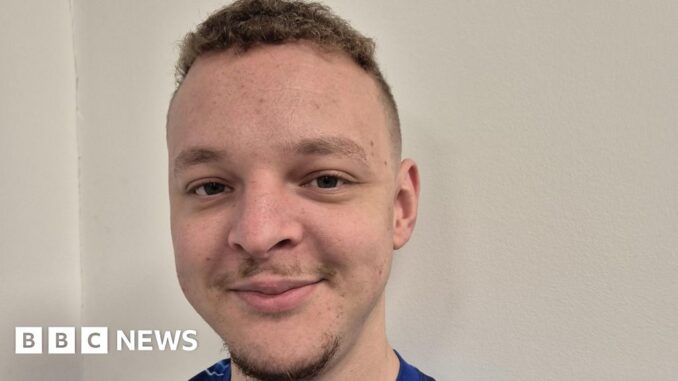
 Rhys Matthews
Rhys MatthewsVulnerable people with care needs are living in “beyond disgraceful” homes because the government has so far failed to enforce a new law, MPs and charities claim.
The Supported Housing Act was passed in June last year to create standards in the sector, after a select committee found the lack of regulation meant some landlords were “profiting” from “unacceptably poor housing”.
But there has still been no consultation on how it should work and an advisory panel on the sector has not yet been set up. The government blamed the delay on the election said it was committed to the consultation and the panel.
Rhys Matthews, 26, told the BBC supported housing was “the worst place I’ve ever lived”.
Councils decide whether someone with care needs, such as a mental or physical health problem, qualifies for supported housing and who can provide it, but otherwise there is almost no regulation.
The council pays the rent for people who are vulnerable due to factors such as disabilities or experience of homelessness, abuse and addiction.
The new law gives the department for housing and local councils powers to set standards for supported housing providers for the first time, but no exact start date has been set for a consultation into how the law will work.
A housing spokesperson said it had “made a clear commitment…to consulting on further measures early next year”.
Meanwhile, the supported housing advisory panel, which is meant to be made up of people from the sector who can provide information to the government, has also not been set up.
The law required it to have been set up in June. The government said it is “committed to establishing” the panel.
‘The worst place I’ve ever lived’
Rhys grew up in foster care and moved into supported housing due to health problems.
He told the BBC the only furniture in his room was a bed and a small cabinet and he piled his possessions on the floor.
He said he was evicted with just an hour’s notice after one of the other residents threw a knife at him and he spent the next two years living on the streets.
“It almost felt like I was the issue, I was the problem, and they wanted to get rid of me,” he said. “I had no idea what my rights were.”
Rhys now lives in supported housing provided by charity Emmaus, where he is paid to work.
Charities and other non-profit groups historically provided supported housing, but private firms have entered the sector over the last decade, with charities and MPs arguing many have exploited the lack of regulation to make millions while providing low-quality housing.
Rhys, like the charities we have spoken to, wants the new supported housing law to enforce minimum standards – bigger rooms, safe shared spaces and qualified support staff.
He wants landlords that do not meet those standards to face criminal convictions in the worst cases. “It needs to have bite,” he said.
‘Unsafe and unregulated’
Jasmine Basran, head of policy and campaigns at homeless charity Crisis, said: “People who have already experienced significant disadvantage are being forced to live without adequate support in unsafe, unsanitary and frankly unliveable conditions.”
She said it was promising the government will be consulting on how to improve supported housing “but we do need to see progress on this – urgently”.
Charlotte Talbott, chief executive of Emmaus UK, said there were “far too many cases where individuals are let down by unscrupulous providers, with substandard support and accommodation having devastating consequences for those who depend on their services”.
The London Assembly described the sector as “unsafe and unregulated”.
Meanwhile, a 2022 BBC investigation found supported housing schemes across the West Midlands were riddled with crime, drugs, and a death in one case.
Yet despite years of concerns, action has been slow, something which does not surprise Rhys.
“It’s so typical from the government,” he said.
“Unfortunately, with supported accommodation and homelessness, it always seems to take a back [seat] in any government, Labour or Conservative.”
Bob Blackman MP, who drafted the Act, criticised the “snail’s pace” in enforcing it, adding action was needed urgently as the sector is a “ticking time bomb”.
The housing department said “it was right that decisions on the consultation were paused during the general election”.
They added that members of the panel “will be appointed in due course” after interviews closed this month.
‘Pressure cooker’
Even if the law is enforced, the National Housing Federation (NHF) said it would not solve “extreme financial challenges caused by severe cuts to funding, combined with rocketing inflation and increasing operating costs”.
It calculates over a third of supported housing providers shut down schemes last year and 60% intend on closing sites in future.
At the same time supported housing supply is falling, many charities say demand has soared due to NHS cuts and rising homelessness.
Sophie Boobis, head of policy and research at Homeless Link, said the consultation was needed so that good providers could set a standard for what good looks like and remove the uncertainty created by the lack of regulation.
“This is a sector at risk…It feels like a pressure cooker at the moment.”


Be the first to comment